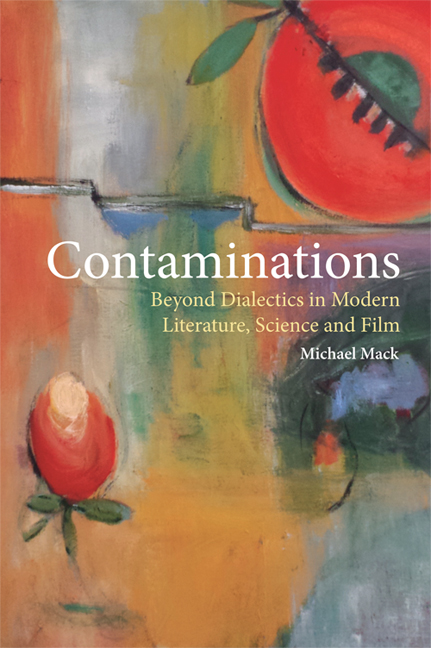Book contents
- Frontmatter
- Contents
- Acknowledgements
- Dedication
- Introduction: Climate Change and the Contamination of the Anthropocene
- 1 Contaminating Psychology with Biology: Descartes, Spinoza, Freud and Žižek
- 2 Contaminating the Visible with the Invisible: From Einstein via H. G. Wells to Hannah Arendt, Luhmann and Derrida
- 3 Contamination of Nature with Society: The Collapse of Natural Order from Melville to Wells and Ellison
- 4 Contaminating Judgement with its Suspension: Guilt and Punishment in Walter Benjamin, Herman Melville and Henry James
- 5 Contaminating the Digital: Action and Perception in Henry James and Alfred Hitchcock
- 6 Contaminating the Sacred with the Profane: Pier Paolo Pasolini and Biopolitics
- 7 Contaminating Posthumanism
- Bibliography
- Index
2 - Contaminating the Visible with the Invisible: From Einstein via H. G. Wells to Hannah Arendt, Luhmann and Derrida
Published online by Cambridge University Press: 05 August 2016
- Frontmatter
- Contents
- Acknowledgements
- Dedication
- Introduction: Climate Change and the Contamination of the Anthropocene
- 1 Contaminating Psychology with Biology: Descartes, Spinoza, Freud and Žižek
- 2 Contaminating the Visible with the Invisible: From Einstein via H. G. Wells to Hannah Arendt, Luhmann and Derrida
- 3 Contamination of Nature with Society: The Collapse of Natural Order from Melville to Wells and Ellison
- 4 Contaminating Judgement with its Suspension: Guilt and Punishment in Walter Benjamin, Herman Melville and Henry James
- 5 Contaminating the Digital: Action and Perception in Henry James and Alfred Hitchcock
- 6 Contaminating the Sacred with the Profane: Pier Paolo Pasolini and Biopolitics
- 7 Contaminating Posthumanism
- Bibliography
- Index
Summary
‘You are invisible now’
Bob Dylan, ‘Like a Rolling Stone’ (1965)Introduction: Einstein's and Latour's contamination of objectivity with subjectivity
In what ways does the Cartesian division between mind and body reinforce hostility to what is invisible and immeasurable? According to Descartes, the body is matter and as such subject to measurement and control by a sovereign mind. The mind, however, remains invisible and cannot be measured. We cannot grasp the mind as an external object. How can we then claim to know that it rules sovereign over the bare life of the body? The invisibility of the mind also denotes the lack of a clear definition distinguishing or separating it from the corporeal. As we have seen in the preceding chapter, new neuroscientific findings have shown that the mind is linked to the body in an inseparable loop.
However, this interconnection between the corporeal and the cerebral does not solve the mystery of the mind's invisibility: the brain may be the material foundation for mental activities but these activities cannot be grasped through any empirical measurements of the grey matter and the skull. As we shall see below, the division between mind and body had particular resonance in the nineteenth century, because Victorian brain-worship in its striking positivism proved inconclusive, especially in semi-para-natural disciplines like phrenology.
Avant-garde twentieth-century science began to take issue with notions of certainty and objectivity which preoccupied nineteenth-century positivism. As Lorraine Daston and Peter Galison have recently shown, ‘many early twentieth-century scientists increasingly concluded that subjectivity could never be extirpated. Some frankly espoused the need for subjective judgment in the production and use of scientific images; objectivity without subjectivity was, they concluded, an ultimately selfdefeating ambition’ (Daston and Galison 2007: 190). Twentieth-century science consciously and conscientiously contaminated the subjective with the objective, recognising that nineteenth-century positivism tried to expurgate the subjective element through an effort of the will.
The paradigm governing science from the mid-nineteenth century to the early twentieth century was what Daston and Galison have called ‘mechanical objectivity’: ‘By mechanical objectivity we mean the insistent drive to repress the wilful interventions of the artist-author, and to put in its stead a set of procedures that would, as it were, move nature to the page through a strict protocol, if not automatically’ (Daston and Galison 2007: 121).
- Type
- Chapter
- Information
- ContaminationsBeyond Dialectics in Modern Literature, Science and Film, pp. 50 - 76Publisher: Edinburgh University PressPrint publication year: 2016



